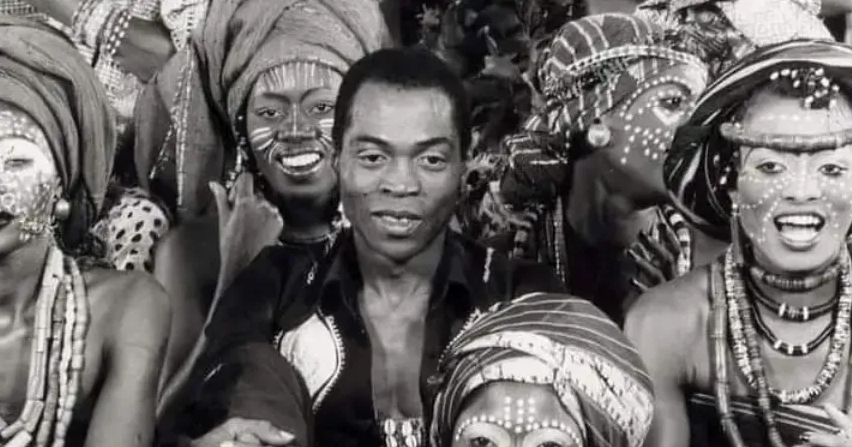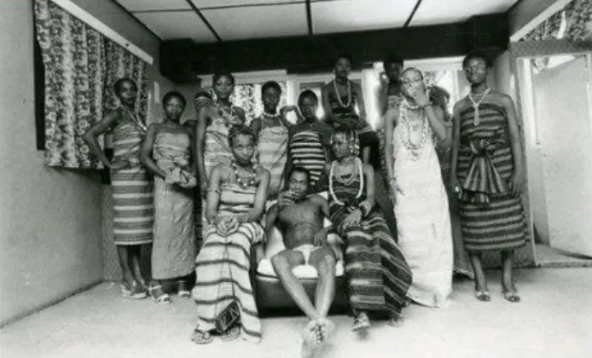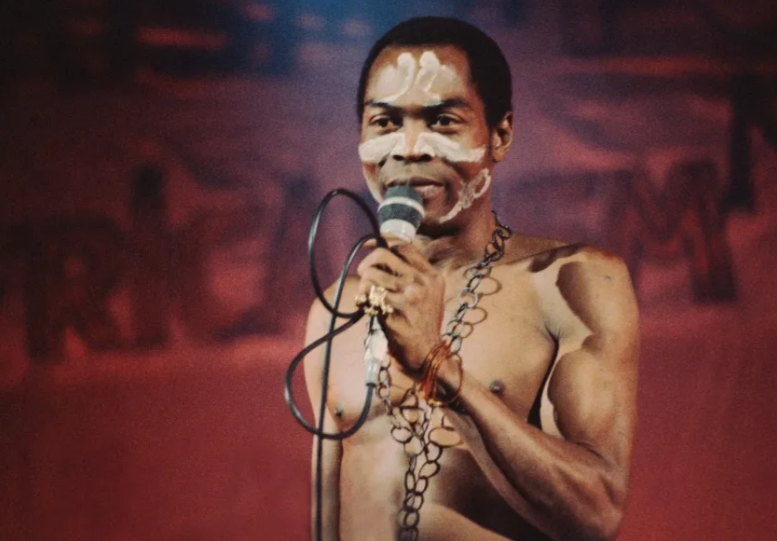Fela Kuti, the Nigerian music legend, had a fascinating personal life. His relationships were as complex and intriguing as his music.
Fela Kuti’s spouses played significant roles in his life and career. Known for his bold political views and Afrobeat rhythms, Fela’s personal life mirrored his public persona. His marriages were unconventional and often reflected his rebellious spirit. Many of his spouses were also involved in his band, contributing to his unique sound.
Understanding the women who stood by him offers deeper insight into Fela’s world. This blog will explore the lives of Fela Kuti’s spouses, highlighting their contributions and influence. Discover the stories behind the women who shared their lives with this iconic artist.
Quick Bio
| Attribute | Details |
| Full Name | Olufela Olusegun Oludotun Ransome-Kuti |
| Date of Birth | October 15, 1938 |
| Date of Death | August 2, 1997 |
| Place of Birth | Abeokuta, Nigeria |
| Nationality | Nigerian |
| Family | Parents: Reverend Israel Oludotun Ransome-Kuti (father) and Funmilayo Ransome-Kuti (mother); Siblings: Olikoye Ransome-Kuti, Beko Ransome-Kuti |
| Profession | Musician, Activist, Composer |
| Height | 5 feet 10 inches (178 cm) |
| Weight | Approx. 150 lbs (68 kg) |
| Body Measurements | Not publicly documented |
| Eye Color | Brown |
| Hair Color | Black |
| Body Type | Slim |
| Gender | Male |
| Sexual Orientation | Heterosexual |
| Age at Death | 58 years old |
| Relationship Status | He married (multiple wives during his lifetime) |

Who Is Fela Kuti?
Fela Kuti, born Olufela Olusegun Oludotun Ransome-Kuti, was a Nigerian musician, composer, pioneer of Afrobeat music, and political activist. Born on October 15, 1938, in Abeokuta, Nigeria, Fela grew up in a prominent family. His father, Reverend Israel Ransome-Kuti, was a respected educator and clergyman, while his mother, Funmilayo Ransome-Kuti, was a noted women’s rights activist and anti-colonial advocate.
Fela’s education began in Nigeria, but he later traveled to London in 1958 to study music at the Trinity College of Music. During his time in the UK, Fela developed a keen interest in jazz and African rhythms, which would eventually become the foundation for his innovative Afrobeat genre. Afrobeat is a vibrant fusion of jazz, funk, highlife, and traditional African music, characterized by complex rhythms, extensive instrumental sections, and politically charged lyrics.
Fela’s career gained momentum in the 1960s and 70s when he returned to Nigeria. His music became a vehicle for addressing social and political issues, such as corruption, inequality, and the abuse of power. Albums like Zombie (1976), Expensive Shit (1975), and Coffin for Head of State (1981) were not only critically acclaimed but also highly controversial, often drawing the ire of the Nigerian government. Fela faced numerous arrests, beatings, and persecution for his outspoken criticism of authority.
Aside from his music, Fela’s personal life was equally unconventional. In 1978, he famously married 27 women in a single ceremony, many of whom were members of his band, Africa ‘70. This act was emblematic of his rejection of societal norms and his embrace of traditional African practices.
Fela Kuti’s legacy endures as one of Africa’s most influential cultural figures. His work continues to inspire musicians worldwide, and his life story highlights the power of art as a tool for activism and resistance. Fela’s impact transcends music, making him a symbol of defiance and cultural pride.
Introduction To Fela Kuti’s Personal Life
A Nigerian musician and activist, Fela Kuti had an intriguing personal life. His charismatic personality and bold choices left an indelible mark on the world.
Early Life
Born on October 15, 1938, in Abeokuta, Nigeria, Fela Anikulapo Kuti came from a prominent family. His father, Reverend Israel Oludotun Ransome-Kuti, was a Protestant minister, and his mother, Funmilayo Ransome-Kuti, was a women’s rights activist. These influences shaped Fela’s worldview and passion for social justice.
Musical Journey
Fela’s musical journey began in London, where he studied at the Trinity College of Music. The jazz and highlife music scenes inspired him. In the 1960s, Fela returned to Nigeria and formed the band Koola Lobitos. His music evolved into a unique genre called Afrobeat. This blend of jazz, funk, and traditional African rhythms resonated with many.
Fela used his music throughout his career to address political and social issues. His songs criticized government corruption and supported human rights. His fearless stance made him a target for authorities and earned him global admiration.
First Marriage To Remi Taylor
Fela Kuti, the pioneer of Afrobeat music, had many intriguing facets to his life. His first marriage to Remi Taylor marked a significant chapter. This union brought both joy and challenges to his life. Below, we explore their meeting, courtship, and life together.
Meeting And Courtship
Fela Kuti met Remi Taylor in the early 1960s. Mutual friends introduced them. The chemistry between them was instant. Fela, known for his charismatic personality, charmed Remi with his passion for music.
On the other hand, Remi was drawn to Fela’s energy and vision. Their courtship was filled with music, dance, and shared dreams. They spent countless hours discussing their future and the impact they wanted to make. Fela’s ambition and Remi’s support made them a strong pair.
Marriage And Life Together
Fela and Remi married in 1961. Their wedding was a modest ceremony attended by close friends and family. After their marriage, they moved into a small house in Lagos. This house soon became a hub for musicians and artists.
The couple faced many challenges. Fela’s growing fame brought both opportunities and obstacles. Remi stood by Fela through thick and thin. She managed the home and supported Fela’s burgeoning career.
Despite Fela’s demanding career pressures, they shared many happy moments. Their bond was strong, rooted in mutual respect and shared goals. Together, they navigated the complexities of fame and family life.
| Year | Event |
| 1961 | Fela and Remi got married |
| 1962 | Moved to Lagos |
| 1963 | Fela’s first major concert |
Fela Kuti’s first marriage to Remi Taylor blended love, music, and resilience. It laid the foundation for much of his later work and influence.
Sandra Izsadore: The American Influence
Sandra Izsadore played a pivotal role in Fela Kuti’s life and music. This American activist and singer brought new ideas to Fela. Their meeting in Los Angeles changed the course of Fela’s career. Sandra introduced Fela to new concepts and movements, shaping his future work.
Impact On Fela’s Music
Sandra exposed Fela to the Black Power movement, which profoundly impacted his music. He began to infuse themes of resistance and empowerment into his songs, and his work started to reflect the struggles and aspirations of African people.
His lyrics became bolder and more political, addressing issues of corruption and injustice. Sandra’s influence was evident in albums like “Zombie” and “Gentleman.” These works echoed the fight for equality and freedom.
Fela’s music style also evolved. He combined traditional African sounds with jazz and funk, creating the unique genre known as Afrobeat. Sandra’s influence helped Fela find his voice in this powerful new form.
Their Relationship
Fela and Sandra’s relationship was complex. They shared a deep bond. Sandra encouraged Fela to think critically about his identity. She inspired him to embrace his African heritage. Their connection was both personal and ideological.
They spent hours discussing politics and culture. Sandra’s insights and experiences opened Fela’s eyes to new perspectives. Their relationship went beyond romance. A meeting of minds spurred Fela’s artistic and personal growth.
Despite their closeness, their relationship faced challenges. Cultural differences and external pressures tested their bond. Yet, Sandra’s impact on Fela remained undeniable. She left a lasting mark on his life and music.
The 27 Wives
Fela Kuti, a legendary musician and activist, lived an unconventional life. One of his most remarkable acts was marrying 27 women in one ceremony. These women were dancers, singers, and composers in his band and his companions in the Kalakuta Republic.
The Marriage Ceremony
On February 20, 1978, Fela Kuti married 27 women in a single ceremony at the Kalakuta Republic, his communal compound in Lagos, Nigeria. The ceremony was both spectacular and controversial. It defied traditional norms and garnered significant media attention.
Fela’s reasons for marrying these women were personal and political. He wanted to protect and honor them. They had suffered harassment and imprisonment alongside him. By marrying them, he aimed to solidify their unity and family bond.
The marriage ceremony included traditional African rituals. It was a vibrant celebration with music, dance, and colorful attire. Fela’s wives wore beautiful traditional dresses, adding to the event’s visual splendor.
Life In The Kalakuta Republic

Life in the Kalakuta Republic was far from ordinary. The community lived by its own rules, separate from mainstream society. The compound was a hub of creativity, music, and activism.
Fela’s 27 wives played vital roles in this community. They were not just his spouses but also his collaborators. They performed in his band, Africa ’70, contributing to its unique sound. Their talents and dedication were integral to Fela’s musical success.
The Kalakuta Republic faced constant challenges. Authorities frequently raided the compound, leading to arrests and property damage. Despite these hardships, the community remained resilient. Fela and his wives continued to produce music and fight for justice.
Their daily life was a mix of rehearsals, performances, and communal activities. The atmosphere was dynamic and filled with artistic energy. Fela’s wives shared a deep bond, supporting each other through thick and thin.
Prominent Wives And Their Stories
Fela Kuti, the legendary Nigerian musician and activist, led a life as colorful as his music. His personal life was equally fascinating, especially his relationships with his wives. A few were particularly prominent among the many women who stood by him. Their stories offer a glimpse into the world of Fela Kuti and his family.
Laide Anikulapo-Kuti
Laide Anikulapo-Kuti was one of Fela’s most well-known wives. She played a significant role in his life and career and had a substantial influence on him. Laide was not just a wife but a partner in his journey. She helped manage his band and supported his political activism.
Laide’s story is one of resilience and dedication. Despite the challenges, she remained steadfast. Her commitment to Fela’s vision was unwavering, making her an integral part of his legacy. She is remembered as a strong woman who stood by her husband through thick and thin.
Najite Anikulapo-kuti
Najite Anikulapo-Kuti was another prominent figure in Fela’s life. She brought a unique energy to their relationship, and her influence extended beyond their personal life. She was deeply involved in Fela’s musical endeavors.
Najite’s support was crucial during Fela’s most challenging times. Her presence provided stability and strength. She was more than just a spouse; she was a collaborator. Najite contributed to Fela’s creative process and helped shape his musical legacy.
The Role Of Women In Fela’s Life And Music
Fela Kuti, the pioneer of Afrobeat, had a unique relationship with women. Women significantly influenced his music and life; his songs often reflected their strengths and struggles. Fela’s wives played various roles in his career, from muses to active contributors.
Inspiration For Songs
Women inspired many of Fela’s songs. His track “Lady” is a famous example. In this song, he praised the modern African woman, highlighting her strength and independence. Another song, “Shakara,” also celebrated women’s power. Fela respected and admired their resilience, and his music often reflected this admiration.
Collaborations And Contributions
Fela’s wives were not just inspirations. They actively contributed to his music, singing backup vocals and dancing during his performances. Their presence added energy and vibrancy to his shows. Fela’s first wife, Remilekun Taylor, played a key role. She supported him through thick and thin.
Here is a table showing some key contributions by Fela’s wives:
| Wife | Contribution |
| Remilekun Taylor | Support and backing vocals |
| Najite Kuti | Dance performances |
| Laide Anikulapo Kuti | Backing vocals |
Fela’s wives also helped him during legal troubles. They stood by him during his arrests and trials. Their loyalty was unyielding, and they formed a strong support system for him.
In his famous Kalakuta Republic, women played significant roles. They managed various aspects of daily life and ensured everything ran smoothly, which was crucial for Fela’s creative process.
In summary, the women in Fela’s life were more than just companions. They were muses, collaborators, and unwavering supporters. Their contributions helped shape his legendary career.
Fela’s Views On Marriage And Polygamy

The Nigerian music legend Fela Kuti had unique views on marriage and polygamy. His ideas were controversial and sparked much debate. This blog post explores his philosophy, beliefs, and the impact he had on society.
Philosophy And Beliefs
Fela Kuti believed in traditional African values. He viewed polygamy as a natural practice. He thought it was a way to strengthen the family unit. Fela married 27 women in a single ceremony. His decision was both a political statement and a personal choice.
Fela’s philosophy was rooted in his opposition to Western norms. He rejected the idea that monogamy was the only way and believed that polygamy provided economic and emotional support. His wives, known as the “Queens,” played vital roles in his life and career. They were dancers, singers, and activists.
His Yoruba heritage influenced Fela’s beliefs. Polygamy was common in Yoruba culture, and he saw it as an expression of freedom and resistance against colonial influence.
Impact On Society
Fela’s views on marriage and polygamy had a significant impact on Nigerian society. Many people admired his bold stance. Others criticized him for promoting what they saw as outdated practices. His lifestyle sparked conversations about gender roles and relationships in Africa.
Fela’s polygamous marriage was more than just a personal choice. It was a form of social and political protest. He challenged the norms imposed by colonial powers. His actions encouraged others to question and rethink societal standards.
Here is a table summarizing Fela’s views:
| Aspect | Fela’s View |
| Polygamy | Natural and supportive |
| Marriage | Traditional, against Western norms |
| Gender Roles | Women as equal partners |
Overall, Fela Kuti’s views on marriage and polygamy continue to be discussed. His life and beliefs still resonate with many people today.
Legacy Of Fela’s Wives
Fela Kuti, the legendary Afrobeat pioneer, left an indelible mark on music. Yet his legacy goes beyond his revolutionary sound. Fela’s wives played a significant role in his life and work, and their influence resonated long after his passing.
Life After Fela
Fela’s wives faced many challenges after he died in 1997. They had to navigate a world without their beloved husband and leader. Despite the hardships, they remained resilient.
Many of them continued to promote Fela’s music and message. They kept his legacy alive through various initiatives. Their dedication ensured that Fela’s vision lived on.
Continued Influence
Fela’s wives also influenced new generations of artists and activists. They inspired many to embrace Afrobeat and its powerful message, and their impact extended beyond music to social and political movements.
Through their efforts, Fela’s ideals of justice and equality remained relevant. They showed that his spirit could not be silenced. Their ongoing work serves as a testament to their strength and commitment.
Frequently Asked Questions
Who Was Fela Kuti’s Spouse?
Fela Kuti’s most notable spouse was Remi Taylor, whom he married in 1961.
Did Fela Kuti Have Multiple Wives?
Yes, Fela Kuti married 27 women in a single ceremony in 1978.
How Many Times Did Fela Kuti Marry?
Fela Kuti married once traditionally and had a mass wedding with 27 women.
Is Fela Kuti’s Wife Still Alive?
Remi Taylor, Fela Kuti’s first wife, passed away in 2000.
Fela Kuti’s Net Worth
| Year | Net Worth (USD) | Monthly Income (USD) | Annual Income (USD) |
| 1992 | $1.5 million | $12,500 | $150,000 |
| 1993 | $1.8 million | $15,000 | $180,000 |
| 1994 | $2.0 million | $16,500 | $198,000 |
| 1995 | $2.2 million | $18,000 | $216,000 |
| 1996 | $2.5 million | $20,000 | $240,000 |
| 1997 | $3.0 million | $25,000 | $300,000 |
Fela Kuti’s financial standing during his lifetime reflected his immense talent and influence. By the early 1990s, his net worth was approximately $1.5 million, primarily derived from his album sales, live performances, and international tours. Though rooted in African traditions, his music garnered global appeal, attracting audiences from Europe, the Americas, and beyond.
Fela’s monthly income, estimated at $25,000 in 1997, came from royalties, concert revenues, and collaborations. However, his wealth was not solely used for personal gain. Fela invested heavily in his band, Africa ‘70, and his community, using his platform to promote cultural and political causes. Despite facing numerous financial setbacks due to government persecution and frequent raids on his properties, Fela’s commitment to art and activism never wavered.
Since his passing in 1997, Fela Kuti’s estate has continued to grow in value due to the enduring popularity of his music and the increasing recognition of his cultural contributions. The establishment of the annual Felabration festival and the preservation of his work have ensured that his legacy remains artistically significant and financially impactful.
Social Media Profile
| Platform | Links |
| You Tube | Click Here |
| Click Here |
Conclusion
Fela Kuti’s spouses played significant roles in his life and music. Their influences shaped his creativity and activism. Each partner added unique experiences and perspectives. Through them, Fela’s legacy continues to inspire. Understanding these relationships gives deeper insight into his world.
Fela Kuti’s life, filled with love and passion, remains captivating. His story is complete with acknowledging these vital women. They, too, are part of his enduring impact. Their contributions deserve recognition and respect. Fela’s journey, shared with these remarkable women, is truly extraordinary.
Read Also About: Anya Taylor-Joy Height


